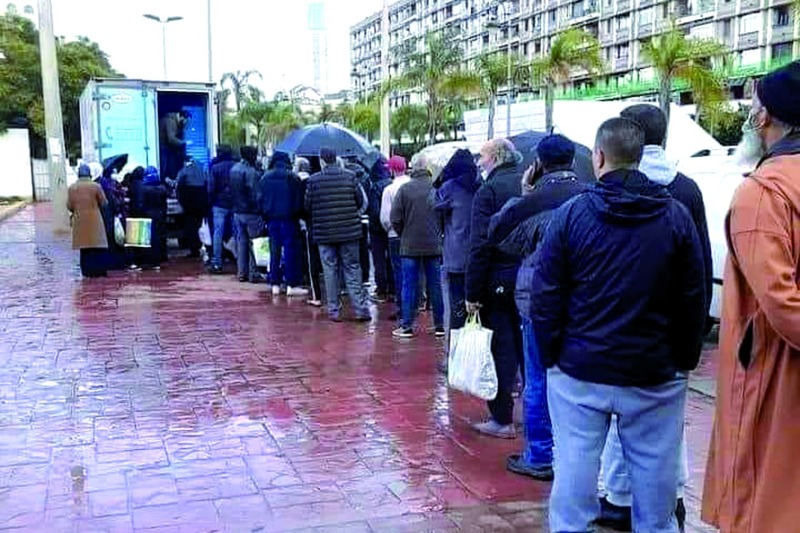Israel hits central Iran in apparently limited retaliatory strike

In Algeria, the more Ramadan goes by and the longer the lines are

In Algeria, people are jostling in front of food stores to buy certain basic necessities and long queues are reappearing. But this phenomenon, which is growing more and more in this holy month of Ramadan, has already been going on for several months in Algeria.
Three basic products are particularly concerned, edible oil, milk in sachets (powdered and reprocessed) and semolina. But not only. Faced with the vertiginous rise in the prices of fruits and vegetables and foodstuffs in general, which are constantly increasing in Algeria, Algerian consumers are finding it increasingly difficult to make ends meet. But this time, the cost of fruit, vegetables and meat is breaking all records… In detail, they have practically doubled. In Algeria, the authorities and the voices of their masters willingly implicate this situation in the impact of Dame Covid and the Russian-Ukrainian crisis, in order to lower social tension. But, it is not so easily told to Algerian citizens. Every year, authorities, consumer associations and the media point with the same voice to the “irrational behavior” of Algerians on the occasion of the holy month of Ramadan, which they describe as a mixture of panic in the face of possible shortages and outbreaks of appetence. There is no smoke without fire. Otherwise why can’t the authorities stem a demonstration that is repeated every Ramadan?
Admittedly, world food prices surged in March and reached their highest levels ever recorded in the markets for basic grains and vegetable oils due to the situation in the Black Sea region (data at the end of March the Food and Agriculture Organization of the United Nations (FAO), but for Algeria in particular it takes on other proportions.”This situation is reminiscent of that experienced by the country in the 1980s, when practically all basic products were sold under the cloak or under close surveillance.“. Say so and moreover by a patent caresser in the direction of the hair, “All about Algeria” (TSA) in this case, that means everything about the extent of the crisis and the food shortage raging in Algeria . The situation is all the more aggravated in that to put one kilogram of powdered milk (imported from France, the EU and the UAE) in the basket of the Algerian housewife, you have to pay 420 dinars ($2.90) in the private instead of 25 dinars for powdered milk subsidized by the State, just like oil (20% increase for vegetable oils and dairy derivatives).
The bakery sector is not left out. Shortages and rising prices affecting yeast, semolina and table oil are threatening several bakeries with closure, despite exemptions from certain professional taxes in order to neutralize the exponential rise in the price of baguettes. Over the past three years, at least three thousand bakers have been forced to put the key under the doormat when they had one. The accumulation of endogenous factors (restriction of imports, maintenance of two colleges of subsidized and free products), in an Algeria without political perspective, speculation and corruption on the rise due to the country’s economic difficulties, mean that the regime of ‘Algiers no longer sails by sight, but in the thick fog of the present.
According to the Algerian parliamentary committee, there is also a problem with the smuggling of subsidized products across Algeria’s southern border to be sold in neighboring countries, and described as very “widespread” under the complacent eye of the military. Moreover, these trinkets benefit them, especially the officers. Up to 12 trucks daily smuggle Algerian-made, state-funded, hard-currency, Algerian-made cooking oil into Mali and Niger – making a profit of up to $17,800 a day. truck loading. However, the root causes of the Algerian crisis go back further, the economy’s dependence on the sale of gas and crude oil as an engine of growth and source of income and the government’s mismanagement of the sector. created many problems like many transactions on the parallel market which benefits the Algerian oligarchy. So all this combined with economic problems, an unemployment rate of almost 15% (most of the unemployed are university graduates) and a population three quarters under the age of 37, it could reach a point where the links already weak points between rulers and ruled could break and even explode.
.
